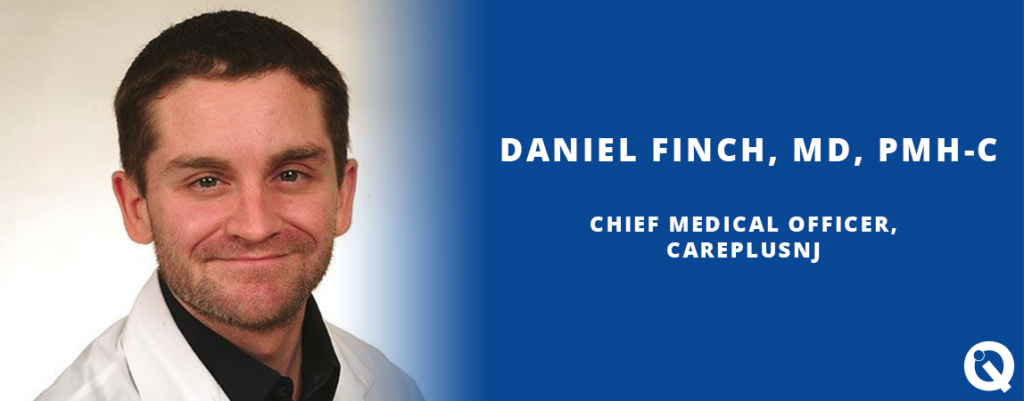Daniel Finch, MD, PMH-C is Chief Medical Officer at CarePlus NJ, a member of the Quality Institute’s Provider Council. The non-profit organization provides recovery-focused integrated primary care, mental health care, and substance abuse rehabilitation services.
The pandemic created great momentum for the use of telehealth. How has CarePlus used telehealth to provide mental health services during this time?
Even prior to the pandemic, CarePlus was really at the forefront of using telehealth. When it became clear that the pandemic surge was inevitable, we immediately focused on getting telehealth equipment to as many of our providers as possible, and actually assigned designated staff to support clients who were unfamiliar with the technology.
For months our IT department was literally working around the clock. To maximize safety, we significantly limited the number of face-to-face contacts in the office, but also provided continuity of care to clients via telehealth. In June, CarePlus was awarded over $400,000 by the Federal Communications Commission to acquire laptops and tablets to provide the rest of our clinicians with that telehealth access, and also to donate cell phones to our clients who need a way to access services. We provided services to thousands of vulnerable clients who would have gone without mental health treatment throughout the pandemic.
How is social distancing impacting addiction recovery?
Addiction recovery often requires daily interactions with addiction recovery specialists and support groups in order to help people maintain sobriety. Additionally, many of these individuals in recovery rely on Medication Assisted Treatment, such as buprenorphine, in addition to their psychotherapy. The social and professional support that these individuals relied on prior to the pandemic was abruptly taken away from them.
At CarePlus, we have a large and extremely dedicated team of addiction recovery specialists who immediately identified the crisis and through the use of telehealth, phone outreach, limited face-to-face, and other engagement methods were able to maintain continuity of care. And currently our addiction services programs are all up and running, using a hybrid approach. Some face-to-face procedures such as urine drug screens continue and we can use telehealth for things like one-to-one and group therapy.
Your new program, the Maternal and Family Center, provides mental health services before, during, and after pregnancy. Why is it so important to prioritize mental health for new moms and their families?
Prior to the pandemic, one in seven new moms and one in 10 new dads suffered from postpartum depression. I’m sure that number has significantly increased. I can tell you that my wife and I lived through a quarantine pregnancy. We have a two-month-old son and a 22-month-old daughter. So when I say that I am passionate about this issue … that’s an understatement. At the recommendations of our doctors, we were extremely cautious with regards to social distancing, including childcare, while both of us continued to work from home, which was very difficult. I really don’t think there’s a word in the English language that adequately describes the level of stress and anxiety that pregnant women and families with children experience during COVID-19.
Many families are still suffering the ongoing cumulative trauma of unemployment, financial hardship, food insecurity, lack of childcare, social isolation … inadequate access to all kinds of health care, including mental health. And that’s important because untreated mental health issues can cause serious complications during pregnancy and birth, throughout early childhood and potentially long-term.
All this stress can cause increased substance abuse, increased intimate partner violence, impairment in parents’ ability to take care of themselves, the baby and the other children in the household. And really the mission of Maternal and Family Center at CarePlus is to provide a wide variety of services to prevent this from happening.
What gaps in care do you see in maternal mental health and how can we overcome them?
Maternal mental health services have historically been few and far between, with many programs located in big academic university settings or private practices that don’t accept insurance. CarePlus is a Certified Community Behavioral Health Clinic (CCBHC) that was recently granted a multimillion-dollar grant through the Substance Abuse and Mental Health Services Administration (SAMHSA) CARES Act. We immediately identified when crafting our grant application that this population was going to need services. So the Maternal and Family Center was developed under this grant, which enables us to provide access to many more individuals and families without being cost-prohibitive.
Our program is unique because it has essentially no exclusionary criteria except for defining the postpartum period as two years after birth, which is actually one year longer than the traditional definition. We are equipped to help couples struggling with infertility, substance use disorders, medication management and therapy, and grief and loss. Our team members are specially trained in perinatal mental health by Postpartum Support International. I am the first and only physician of any specialty to attain the Perinatal Mental Health (PMH-C) certification. In addition to my training, and just being a dad who lived during these times, I will stop at nothing to make sure our program provides all the mental health services possible to women and families in need.
As a new dad, I’m sure it may be hard to find any free time, but if you did, how would you spend it?
This past weekend I was lucky enough to spend a wonderful afternoon with my wife and two children in a sparsely populated and large park and playground. I got to feel the fresh air and sunlight on my face — through a mask and social distancing — and see my new baby sleeping in a carriage and my beautiful wife and toddler running around the swing set. I felt an overwhelming sense of serenity and hopefulness that one day soon we will return to a new normal, and that there will be lots more swing sets yet to conquer.

